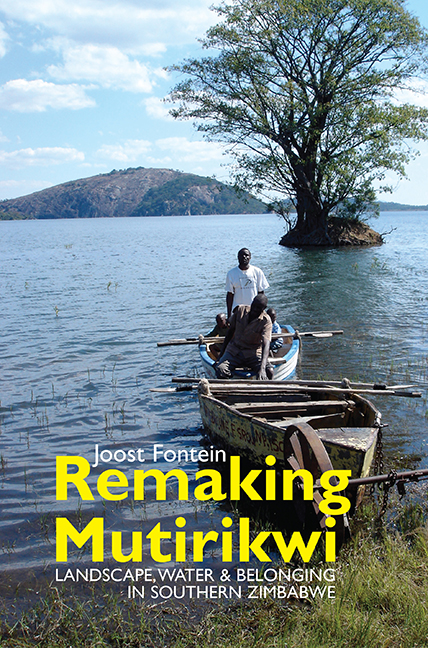Book contents
- Frontmatter
- Dedication
- Contents
- Illustrations
- Acknowledgements
- Note on Fieldwork, Notes & Sources
- Glossary
- Acronyms & Abbreviations
- Chronology
- Remaking Mutirikwi: An Introduction
- Part One Remaking Mutirikwi in the 2000s
- Part Two Damming Mutirikwi 1940s–1990s
- Epilogue: Remaking Mutirikwi in the late 2000s & early 2010s
- Bibliography
- Index
- Eastern African Studies
Remaking Mutirikwi: An Introduction
Published online by Cambridge University Press: 11 June 2021
- Frontmatter
- Dedication
- Contents
- Illustrations
- Acknowledgements
- Note on Fieldwork, Notes & Sources
- Glossary
- Acronyms & Abbreviations
- Chronology
- Remaking Mutirikwi: An Introduction
- Part One Remaking Mutirikwi in the 2000s
- Part Two Damming Mutirikwi 1940s–1990s
- Epilogue: Remaking Mutirikwi in the late 2000s & early 2010s
- Bibliography
- Index
- Eastern African Studies
Summary
The Mutirikwi river was dammed in the early 1960s to make Zimbabwe's second largest lake. This was a key moment in the ‘Europeanisation’ of Mutirikwi's landscapes, which had begun with colonial land appropriations in the 1890s. But African landscapes were not obliterated by what became known as the Kyle dam. They remained active and affective. At independence in 1980, local clans re-asserted ancestral land claims in a wave of squatting around Mutirikwi. But they were soon evicted as the new government asserted its control over the remaking of Mutirikwi's landscapes. Amid fast-track land reform in the 2000s, the same people returned again to reclaim and remake Mutirikwi's landscapes. Many returned to the graves and ruins of past lives forged in the very substance of the soil, and even incoming war veterans and land reform's so-called ‘new farmers’ appealed to local clans’ autochthonous knowledge to ‘make safe’ their own resettlements. This book explores those re-occupations – and the complex contests over land, water, belonging and authority they provoked – both ethnographically and historically. It offers a detailed ethnographic and historical study of land reform in Zimbabwe from the perspective of those involved in land occupations around Lake Mutirikwi, including local clans, chiefs and spirit mediums, as well as government technocrats, war veterans, and new farmers.
Through analytical lenses focused on the political materialities of water and land, it reveals how the ongoing remaking of Mutirikwi's landscapes has always been deeply entangled in changing strategies of colonial and postcolonial statecraft. It highlights how the active traces of different past regimes of rule – Rhodesian and Zimbabwean, developmentalist, traditionalist and everything in between – intertwine in contemporary politics through the active and enduring yet emergent forms and substances of landscape. The 2000s may have heralded a longdelayed ‘re-Africanisation’ of Mutirikwi's landscapes, but just as African presence was never obliterated by the dam, so colonial and white presence too remains active and affective through Rhodesian-era discourses, place-names and the materialities of ruined farms, contour ridging and old irrigation schemes. Remaking Mutirikwi therefore focuses on how claims and practices of belonging and autochthony articulate with practices of authority and power in the present, through the enduring yet emergent materialities of water and landscape.
- Type
- Chapter
- Information
- Remaking MutirikwiLandscape, Water & Belonging in Southern Zimbabwe, pp. 1 - 24Publisher: Boydell & BrewerPrint publication year: 2015

